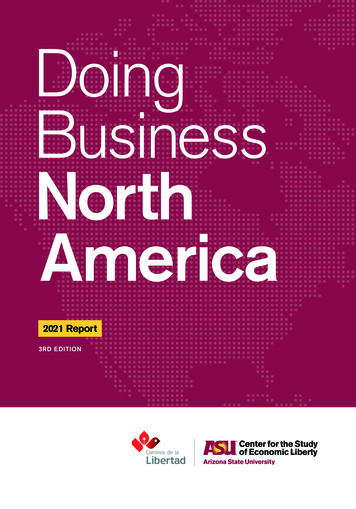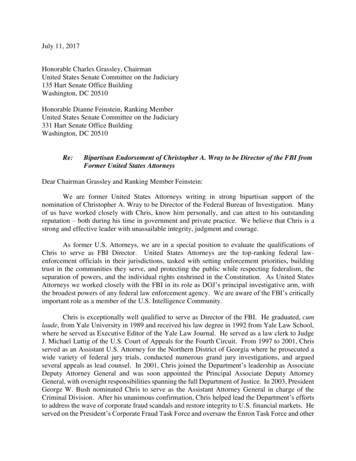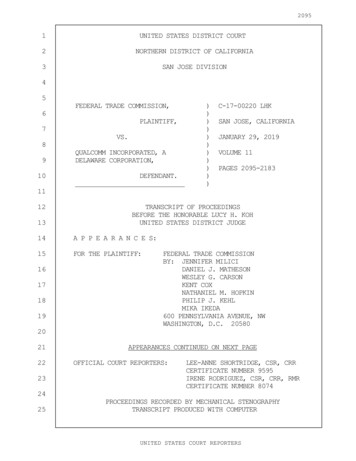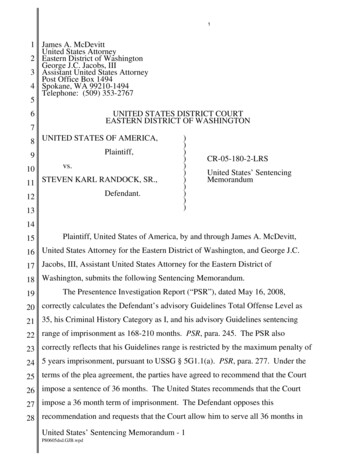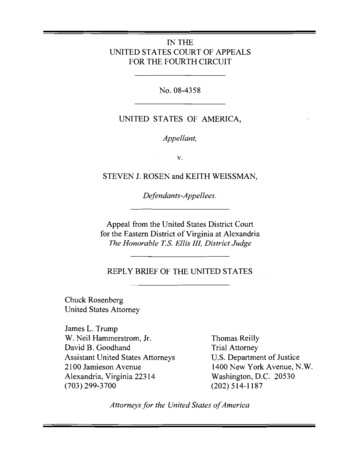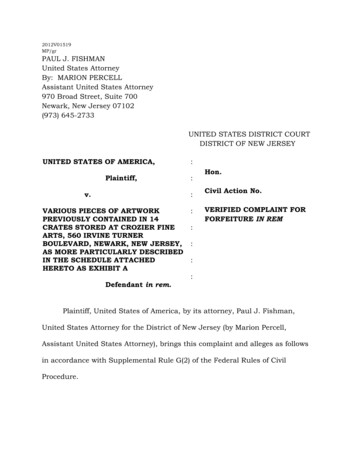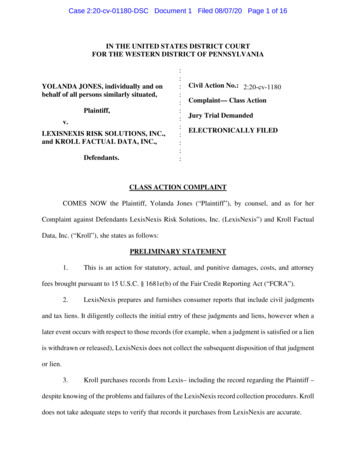
Transcription
Case 2:20-cv-01180-DSC Document 1 Filed 08/07/20 Page 1 of 16IN THE UNITED STATES DISTRICT COURTFOR THE WESTERN DISTRICT OF PENNSYLVANIAYOLANDA JONES, individually and onbehalf of all persons similarly situated,Plaintiff,v.LEXISNEXIS RISK SOLUTIONS, INC.,and KROLL FACTUAL DATA, INC.,Defendants.::::::::::::Civil Action No.: 2:20-cv-1180Complaint— Class ActionJury Trial DemandedELECTRONICALLY FILEDCLASS ACTION COMPLAINTCOMES NOW the Plaintiff, Yolanda Jones (“Plaintiff”), by counsel, and as for herComplaint against Defendants LexisNexis Risk Solutions, Inc. (LexisNexis”) and Kroll FactualData, Inc. (“Kroll”), she states as follows:PRELIMINARY STATEMENT1.This is an action for statutory, actual, and punitive damages, costs, and attorneyfees brought pursuant to 15 U.S.C. § 1681e(b) of the Fair Credit Reporting Act (“FCRA”).2.LexisNexis prepares and furnishes consumer reports that include civil judgmentsand tax liens. It diligently collects the initial entry of these judgments and liens, however when alater event occurs with respect to those records (for example, when a judgment is satisfied or a lienis withdrawn or released), LexisNexis does not collect the subsequent disposition of that judgmentor lien.3.Kroll purchases records from Lexis– including the record regarding the Plaintiff –despite knowing of the problems and failures of the LexisNexis record collection procedures. Krolldoes not take adequate steps to verify that records it purchases from LexisNexis are accurate.
Case 2:20-cv-01180-DSC Document 1 Filed 08/07/20 Page 2 of 164.Both LexisNexis, as the originating consumer reporting agency (“CRA”), andKroll, as the Reseller CRA, have statutory obligations to use reasonable procedures to ensure themaximum possible accuracy of their reports. 15 U.S.C. § 1681e(b). Neither uses such procedures.Accordingly, both Defendants are liable to Plaintiff and the Class under the FCRA.JURISDICTION5.The Court has jurisdiction under 28 U.S.C. § 1331 and 28 U.S.C. § 1681p.6.LexisNexis and Kroll regularly do business here. LexisNexis furnished the reportregarding the Plaintiff (and others regarding Kroll reported consumers).7.Kroll does business from its office in Pittsburgh, where its parent company, CBCInnovis, is headquartered.PARTIES8.Plaintiff is a natural person and a “consumer” as defined by § 1681a(c) of the9.Defendant Lexis Nexis is a “consumer reporting agency” as defined in 15 U.S.C.FCRA.§1681a(f).10.LexisNexis is regularly engaged in the business of assembling, evaluating, anddispersing information concerning consumers for the purpose of furnishing consumer reports, asdefined in 15 U.S.C. § 1681a(d), to third parties.11.Defendant Kroll is a corporation with a principal place of business in Pittsburgh,Pennsylvania. Kroll is a “consumer reporting agency” as defined in 15 U.S.C. §1681a(f).12.Kroll is regularly engaged in the business of assembling, evaluating, and dispersinginformation concerning consumers for the purpose of furnishing consumer reports, as defined in15 U.S.C. § 1681a(d), to third parties.2
Case 2:20-cv-01180-DSC Document 1 Filed 08/07/20 Page 3 of 16FACTUAL ALLEGATIONSA.Defendant LexisNexis’s Procedures13.LexisNexis affirmatively seeks out and purchases public records data, including taxliens and civil judgments, to include this derogatory information in the credit reports it sells.14.LexisNexis proactively gathers and disseminates this derogatory information eventhough there is nothing in the FCRA that affirmatively requires it to do so.15.For years, LexisNexis was the exclusive CRA provider of tax lien and civiljudgment information that was included on credit reports issued by the “Big 3” credit bureaus,Experian, Equifax, and TransUnion.16.The Big 3 hid LexisNexis’ involvement in the reporting of public records, and untilrecently did not disclose to consumers that LexisNexis was the entity that collected tax liens andcivil judgments for inclusion in credit reports.17.The public record information provided to the Big 3 by LexisNexis was frequentlyinaccurate and out-of-date.18.In 2015, the Big 3 CRAs entered into a multi-state settlement agreement with over30 state attorneys general that attempted to alleviate some of the accuracy issues with respect tothe reporting of tax liens and civil judgments.19.In 2017, pursuant to that settlement, the Big 3 agreed to only report public recordsif they were updated every 90 days.20.In 2018 and 2019, the Big 3 went a step further, and agreed to stop completelyreporting public records and tax liens as part of three nationwide class actions settlements. Clark3
Case 2:20-cv-01180-DSC Document 1 Filed 08/07/20 Page 4 of 16v. Trans Union, LLC, Case No. 3:15-cv-00391 (E.D. Va.); Clark v. Experian Info. Sols., Inc., No.3:16-cv-00032 (E.D. Va.); Thomas et al. v. Equifax Information Services, LLC, Case No. 3:18-cv00684-MHL (E.D. Va.).21.LexisNexis, however, has decided to take advantage of the Big 3’s decision to stopselling LexisNexis’s data by marketing public record credit reports under its own brand.22.LexisNexis has issued marketing materials targeted at lenders and creditorsregarding the purported “negative consequences” of not having tax lien and civil judgmentinformation included in credit reports. 123.LexisNexis markets its “RiskView Liens and Judgment Report” as providing theinformation no longer provided by the Big 3: “After the removal of liens and judgments data fromcredit reporting agencies, companies found themselves in need of other data sources to supporttheir models. Learn how LexisNexis Risk Solutions offers a product that provides liens andjudgments so that credit models don’t have to be recalibrated or altered.” 224.Of course, LexisNexis does not disclose in its marketing materials that theinaccuracies in its data are the reason why the Big 3 stopped reporting civil judgments and taxliens.25.LexisNexis uses automated procedures and, in some instances, inexpensive“independent-contractor” (work from home) vendors to collect information regarding judgmentsand tax liens that undergo little, if any, meaningful quality control.1See LexisNexis, Liens and Judgments Impact Report, available ments-Impact-Report (last accessed August 7,2020)2See LexisNexis, Presentation, available at and-judgments (last accessedAugust 7, 2020)4
Case 2:20-cv-01180-DSC Document 1 Filed 08/07/20 Page 5 of 1626.As a matter of common policy, LexisNexis does not adequately update tax lien orjudgment disposition information when a civil judgment or tax lien is satisfied.27.For example, in litigation against Experian, which obtained its records fromLexisNexis, the data analyzed showed an average delay in obtaining and reporting civil judgmentstatus updates at 77 months, and in South Carolina, lien updates took an average of 243.5 daysbetween the time the disposition update was recorded in the public record and the date thatExperian eventually obtained it.28.LexisNexis fails to update dispositions (satisfactions, vacaturs, withdraws, appealsand dismissals) because it is more expensive to do so than to use its current inadequate procedures.Updating records to appropriately reflect satisfactions would require a much more rigorous set ofprocedures to collect those records and update the original records than LexisNexis currentlyemploys. Implementing those procedures would require further has invested in the collectionprocess and in LexisNexis’s procedures for updating its data. For example, while cases are filedin sequential order and thus assigned indexable case numbers, later dispositions typically are filedunder the original case number. LexisNexis would have to gather these records on a timely andbasis, and then use advanced processes to assign the later-filed dispositions to the correspondingoriginal judgment or lien.29.Similarly. LexisNexis often cannot obtain full personally identifying information(full name, date of birth, social security number, address, etc.) from online reviews of publiclyavailable Internet docket indices, which is how it obtains its records. Instead, LexisNexis wouldhave to obtain the actual court or use electronic sources which are not available on the Internet toobtain more detailed information.Because it fails to obtain full identifying information,LexisNexis frequently attributes records to the wrong consumers.5
Case 2:20-cv-01180-DSC Document 1 Filed 08/07/20 Page 6 of 1630.Thus, LexisNexis published public records data that it knew would be inaccurate ifa release, satisfaction, dismissal, vacatur or appeal had occurred. LexisNexis relies on consumersto clean up their own files via the dispute process after learning of the inaccuracy, rather thanpaying to have these dispositions collected in a manner that would ensure accuracy in the firstinstance.31.LexisNexis has known about its inadequate procedures for years. In addition tobeing aware of lawsuits filed related to the quality of its records, LexisNexis has also gained thisknowledge through disputes received from consumers, including disputes sent directly toLexisNexis by consumers and disputes received from the Big 3 and other credit bureaus ininstances where a consumer disputed their public record with the credit bureau directly.32.The methods and processes used by LexisNexis to gather releases, satisfactions,vacaturs, and dismissals have been materially the same for the previous five years.33.At all times pertinent to this Complaint, LexisNexis’ unlawful conduct regardingthe collection of disposition information was willful and carried out in reckless disregard forconsumers’ rights as set forth under the FCRA.34.By way of example only, and without limitation, LexisNexis’s conduct was willfulbecause it was intentionally accomplished through intended procedures; it had knowledge of itsviolation through other lawsuits in other jurisdictions but it did nothing to rectify the problem, andbecause it was motivated by placing LexisNexis’ financial interests above the interests ofconsumers in accurate reporting. LexisNexis believed that its reporting derogatory creditinformation about tax liens and judgments was of greater economic value to its paying customersthan “disposition” information that demonstrated that the debt was no longer owed.35.As a result of LexisNexis’s conduct, Plaintiff and the putative class members6
Case 2:20-cv-01180-DSC Document 1 Filed 08/07/20 Page 7 of 16suffered particularized and concrete injuries, including damage to their reputations, reductions totheir credit scores, and increased risks that they would be denied credit.B.Defendant Kroll’s Procedures36.Kroll boasts that it is a “trusted provider of credit, risk mitigation, flood, andverification services to the mortgage industry.”37.Kroll provides “tri-merge” credit reports for mortgage loan applications in which itpurchases, reorganizes and compiles and then resells consumer credit files it purchases form theBig-3.38.Now, and during the class period, Kroll has added a fourth credit report – theLexisNexis “Riskview” report, which contains judgment and tax lien information.39.Kroll purchases and resells the LexisNexis report because it is less expensive thanKroll searching and compiling judgment and lien information directly. It is also less expensivethan Kroll obtaining information from more accurate sources.40.Kroll has long been a member of the industry group Consumer Data IndustryAssociation (“CDIA”), as have been LexisNexis as well as Kroll’s parent company, the fourthlargest national credit reporting agency, CBC Innovis.41.Further, Kroll’s management reads and reviews legal and other industrydevelopments and regularly attend seminars and trade events put on by the CDIA.42.As a result of all of its regular review and industry participation, Kroll was awareof the Attorneys General actions and then settlements with the Big-3 regarding their reporting ofthe LexisNexis reports.43.As a result of all of its regular review and industry participation, Kroll was awareof the national class actions and then settlements with the Big-3 regarding their reporting of the7
Case 2:20-cv-01180-DSC Document 1 Filed 08/07/20 Page 8 of 16LexisNexis reports.44.Kroll is aware that even its parent, CBC Innovis, remains in class action litigationregarding its continued use of the inaccurate LexisNexis reports.45.Kroll is also aware of all of this because the Big-3 have ceased selling publicrecords within their reports and LexisNexis had to explain why.46.Notwithstanding all of this notice, Kroll has resold LexisNexis reports withoutsufficient independent investigation, audits, research or review to ensure that LexisNexis hadsomehow corrected the gross inaccuracies that caused the Big-3 to cease reporting its data.47.By way of example only, and without limitation, Kroll’s conduct was willfulbecause it was intentionally accomplished through intended procedures; it had knowledge of itsviolation through other lawsuits in other jurisdictions but it did nothing to rectify the problem, andbecause it was motivated by placing its financial interests above the interests of consumers inaccurate reporting. Kroll believed that its reporting derogatory credit information about tax liensand judgments was of greater economic value to its paying customers than “disposition”information that demonstrated that the debt was no longer owed.48.As a result of Kroll’s conduct, Plaintiff and the putative class members sufferedparticularized and concrete injuries, including damage to their reputations, reductions to theircredit scores, and increased risks that they would be denied credit.C.Plaintiff’s Experience49.On January 12, 2017, Tower Loan of Collins filed a case against Plaintiff in theJustice Court for Covington County, Mississippi.50.The Court ruled in favor of Tower Loan of Collins and a judgment was enteredagainst Plaintiff on April 19, 2017.8
Case 2:20-cv-01180-DSC Document 1 Filed 08/07/20 Page 9 of 1651.The judgment was satisfied and paid in full on October 23, 2017.52.In 2018, Plaintiff applied for a mortgage with a local lender, Peoples Bank.53.As part of that loan application process, the lender purchased a credit report fromKroll. That report was dated August 8, 2018.54.The Kroll report contained a LexisNexis Riskview report showing the Tower Loanjudgment still as unpaid and unsatisfied. This was inaccurate.55.Plaintiff then also obtained a copy of her LexisNexis file in May 2020.56.Even as late as May 2020, LexisNexis still neglected to report the case status or thesatisfaction date. Thus, LexisNexis’ reporting of the civil judgment remained misleading andincomplete.57.Plaintiff disputed LexisNexis’ misreporting. Plaintiff informed LexisNexis that thepublic record was satisfied.58.Despite such notice, LexisNexis failed to conduct a reasonable investigation.59.LexisNexis provided its investigation results to Plaintiff dated May 28, 2020.LexisNexis refused to update its reporting of the civil judgment despite Plaintiff’s dispute and theCourt’s entry of satisfaction over two years prior.60.Instead, LexisNexis generated its dispute response and did not make materialchanges to its reporting of the civil judgment.61.Upon information and belief, LexisNexis continues to report the civil judgmentwithout a case status or satisfaction date. This reporting is misleading because it does not reflectthe accurate status of the record at the time of the report, and causes creditors to believe Plaintiffnever paid the judgment against her.9
Case 2:20-cv-01180-DSC Document 1 Filed 08/07/20 Page 10 of 16CLASS ACTION ALLEGATIONS62.Plaintiff brings this action pursuant to Fed. R. Civ. P. 23(b)(3) against LexisNexison behalf of the following class (the “LexisNexis Class”):All natural persons who: (i) were the subject of a civil judgment and/or tax lienrecorded in any court clerk’s office or court in the United States (ii) where thejudgment or lien appeared within a Kroll Factual Data or CBC Innovis consumerreport dated within the five year period preceding the filing date of this Complaint,and (iii) where the public record filing of the related governmental agency indicatedthat the civil judgment or tax lien had been satisfied, vacated, dismissed, releasedor withdrawn on a date at least 30 days prior to the date of the consumer report.Excluded from the class are all persons who have signed a written release of theirclaim, counsel in this case, and the Court and its employees.63.Plaintiff brings this action pursuant to Fed. R. Civ. P. 23(b)(3) against Kroll onbehalf of the following class (the “Kroll Class”):All natural persons who: (i) were the subject of a civil judgment and/or tax lienrecorded in any court clerk’s office or court in the United States (ii) where thejudgment or lien appeared within a Kroll Factual Data consumer report dated withinthe five year period preceding the filing date of this Complaint, and (iii) where thepublic record filing of the related governmental agency indicated that the civiljudgment or tax lien had been satisfied, vacated, dismissed, released or withdrawnon a date at least 30 days prior to the date of the consumer report.Excluded from the class are all persons who have signed a written release of theirclaim, counsel in this case, and the Court and its employees.64.Numerosity. The class members are so numerous that joinder of all is impractical.Although the precise number of class members is known only to Defendants there are hundreds ofthousands of recorded tax liens and civil judgments nationwide and Kroll is one of the largest trimerge, and mortgage report CRAs nationally.65.The names and addresses of the class members are identifiable through documentsmaintained by Defendants and CBC Innovis, and through public entities that maintain civil10
Case 2:20-cv-01180-DSC Document 1 Filed 08/07/20 Page 11 of 16judgement and tax lien information.66.Civil judgement and tax lien data can be compared to Defendants’ data to ascertainwhich consumers would meet the definition of the classes above.67.Existence and Predominance of Common Questions of Law and Fact. Commonquestions of law and fact exist as to all members of the class, and predominate over the questionsaffecting only individual members. The common legal and factual questions include, amongothers:a.Whether Defendants adopted procedures that collected and reported updates toliens that were less systematic and effective than those it used to initially collect and report theliens and civil judgments;b.Whether this conduct constituted a violation of the FCRA; andc.Whether the violation was negligent, reckless, knowing, or intentionally committedin conscious disregard of the rights of Plaintiff and the putative class members.68.Typicality. Plaintiff’s claims are typical of the claims of each class member, whichall arise from the same operative facts and are based on the same legal theories. Plaintiff, as everyputative class member, alleges a violation of the same FCRA provision, 15 U.S.C. § 1681e(b).This claim challenges the credit reporting procedures of Defendants and does not depend on anyindividualized facts. Each Defendant’s notice and knowledge of the challenged reporting problemis the same for Plaintiff, as for the putative class.69.Adequacy. Plaintiff will fairly and adequately protect the interests of the class.Plaintiff has retained counsel experienced in handling actions involving unlawful practices againstconsumers and class actions. Neither Plaintiff nor his counsel have any interests that might causethem not to vigorously pursue this action. Plaintiff is aware of his responsibilities to the putative11
Case 2:20-cv-01180-DSC Document 1 Filed 08/07/20 Page 12 of 16class and has accepted such.70.Predominance and Superiority. Questions of law and fact common to the classmembers predominate over questions affecting only individual class members, and a class actionis superior to other available methods for the fair and efficient adjudication of the controversy.Each Defendant’s conduct described in this Complaint stems from common and uniform practices,resulting in common violations of the FCRA. Members of the classes do not have an interest inpursuing separate actions against LexisNexis or Kroll, as the amount of each class member’sindividual claim is small compared to the expense and burden of individual prosecution. Classcertification also will obviate the need for unduly duplicative litigation that might result ininconsistent judgments concerning Defendant’s practices. Moreover, management of this actionas a class action will not likely present any difficulties. In the interests of justice and judicialefficiency, it would be desirable to concentrate the litigation of all class members’ claims in asingle forum.71.This action should be maintained as a class action because the prosecution ofseparate actions by individual members of the class would create a risk of inconsistent or varyingadjudications with respect to individual members which would establish incompatible standardsof conduct for the parties opposing the class, as well as a risk of adjudications with respect toindividual members which would as a practical matter be dispositive of the interests of othermembers not parties to the adjudications or substantially impair or impede their ability to protecttheir interests.CAUSES OF ACTIONCOUNT I15 U.S.C. § 1681e(b)Class Action Claim on behalf of Plaintiff and the LexisNexis Class12
Case 2:20-cv-01180-DSC Document 1 Filed 08/07/20 Page 13 of 1672.Plaintiff incorporates by reference all preceding paragraphs as alleged above.73.Defendant LexisNexis violated 15 U.S.C. § 1681e(b) by failing to establish or tofollow reasonable procedures to assure maximum possible accuracy in the preparation of theconsumer reports it furnished regarding Plaintiff and the LexisNexis class members.74.As a result of Defendants’ misconduct, Plaintiff and putative class memberssuffered damages to their reputations, reductions to credit scores, increased risk of credit denialand other concrete actual harm.75.Defendant LexisNexis’ violation of 15 U.S.C. § 1681e(b) was willful, rendering itliable pursuant to 15 U.S.C. § 1681n. In the alternative, LexisNexis was negligent, entitlingPlaintiff to recover under 15 U.S.C. § 1681o.76.Plaintiff and the LexisNexis class members are entitled to recover statutorydamages, punitive damages, costs, and attorneys’ fees from Defendants in an amount to bedetermined by the Court pursuant to 15 U.S.C. § 1681n.COUNT II15 U.S.C. § 1681e(b)Class Action Claim on behalf of Plaintiff and the Kroll Class77.78.Plaintiff incorporates by reference all preceding paragraphs as alleged above.Defendant Kroll violated 15 U.S.C. § 1681e(b) by failing to establish or to followreasonable procedures to assure maximum possible accuracy in the preparation of the consumerreports it furnished regarding Plaintiff and the Kroll class members.79.As a result of Defendants’ misconduct, Plaintiff and putative class memberssuffered damages to their reputations, reductions to credit scores, increased risk of credit denialand other concrete actual harm.13
Case 2:20-cv-01180-DSC Document 1 Filed 08/07/20 Page 14 of 1680.Defendant Kroll’s violation of 15 U.S.C. § 1681e(b) was willful, rendering it liablepursuant to 15 U.S.C. § 1681n. In the alternative, Kroll was negligent, entitling Plaintiff to recoverunder 15 U.S.C. § 1681o.81.Plaintiff and the Kroll class members are entitled to recover statutory damages,punitive damages, costs, and attorneys’ fees from Defendants in an amount to be determined bythe Court pursuant to 15 U.S.C. § 1681n.COUNT III15 U.S.C. § 1681i against LexisNexisIndividual Claim82.Plaintiff incorporates by reference all preceding paragraphs as alleged above.83.LexisNexis violated multiple sections of 15 U.S.C. § 1681i, including but notlimited to: (1) failing to conduct a reasonable reinvestigation to determine whether the disputedinformation was inaccurate and record the current status of the disputed information in violationof § 1681i(a)(1); (2) failing to review and consider all relevant information from Plaintiff inviolation of §1681i(a)(4); (3) failing to promptly modify the disputed inaccurate item ofinformation upon a lawful reinvestigation of § 1681i(a)(5)(A).84.As a result of LexisNexis’s misconduct, Plaintiff has suffered damages to herreputation, reductions to credit scores, and increased risk of credit denial along with emotionaldistress, including frustration, anger, worry, and embarrassment.85.Defendants’ violation of 15 U.S.C. § 1681i was willful, rendering Defendant liablepursuant to 15 U.S.C. § 1681n. In the alternative, LexisNexis was negligent, entitling Plaintiff torecover under 15 U.S.C. § 1681o.14
Case 2:20-cv-01180-DSC Document 1 Filed 08/07/20 Page 15 of 1686.Plaintiff is entitled to recover actual and/or statutory damages, punitive damages,costs, and attorneys’ fees from LexisNexis in an amount to be determined by the Court pursuantto 15 U.S.C. §§ 1681n, o.PRAYER FOR RELIEFWHEREFORE, Plaintiff asks for judgment against the Defendants, for class certificationas pled; for statutory and punitive damages for herself and each member of the LexisNexis Classfor Count One; for statutory and punitive damages for herself and each member of the Kroll Classfor Count Two; for actual, statutory and punitive damages for herself against LexisNexis pursuantto Count Three; for equitable and injunctive relief; and for attorneys’ fees and costs and such otherspecific or general relief the Court does find just and appropriate.JURY DEMANDPlaintiff hereby requests and demands a trial by jury.Dated: August 7, 2020Respectfully submitted,BERGER MONTAGUE PC/s Sarah R. Schalman-BergenSarah R. Schalman-Bergen (PA 206211)1818 Market Street, Suite 3600Philadelphia, PA 19103(215) 875-3053(215) 875-4604 (Facsimile)sschalman-bergen@bm.netE. Michelle Drake (pro hac vice to be filed)BERGER MONTAGUE PC43 SE Main Street, Suite 505Minneapolis, MN 55414Phone: (612) 594-5999Fax: (612) 584-4470emdrake@bm.net15
Case 2:20-cv-01180-DSC Document 1 Filed 08/07/20 Page 16 of 16Leonard A. Bennett (pro hac vice to be filed)Craig C. Marchiando (pro hac vice to be filed)CONSUMER LITIGATIONASSOCIATES, P.C.763 J. Clyde Morris Blvd., Suite 1-ANewport News, VA 23601Telephone: (757) 930-3660Facsimile: (757) 930-3662Email: lenbennett@clalegal.comEmail: craig@clalegal.comKristi C. Kelly, Esq., (pro hac vice to be filed)KELLY GUZZO, PLC3925 Chain Bridge Road, Suite 202Fairfax, VA 22030(703) 424-7572(703) 591-0167 FacsimileEmail: kkelly@kellyguzzo.comAttorneys for Plaintiff and the Proposed Class16
2:20-cv-1180Case 2:20-cv-01180-DSC Document 1-1 Filed 08/07/20 Page1 of 3CIVIL COVER SHEETJS 44 (Rev. 0 )The JS 44 civil cover sheet and the information contained herein neither replace nor supplement the filing and service of pleadings or other papers as required by law, except asprovided by local rules of court. This form, approved by the Judicial Conference of the United States in September 1974, is required for the use of the Clerk of Court for thepurpose of initiating the civil docket sheet. (SEE INSTRUCTIONS ON NEXT PAGE OF THIS FORM.)I. (a) PLAINTIFFSDEFENDANTSYOLANDA JONES, on behalf of herself and all others similarly situated,(b) County of Residence of First Listed PlaintiffLEXISNEXIS RISK SOLUTIONS, INC. and KROLL FACTUAL DATA,INC.New York, NYCounty of Residence of First Listed Defendant(EXCEPT IN U.S. PLAINTIFF CASES)(IN U.S. PLAINTIFF CASES ONLY)IN LAND CONDEMNATION CASES, USE THE LOCATION OFTHE TRACT OF LAND INVOLVED.NOTE:(c) Attorneys (Firm Name, Address, and Telephone Number)Attorneys (If Known)Sarah R. Schalman-Bergen, Berger Montague PC, 1818 Market Street,Suite 3600, Philadelphia, PA 19103, 215-875-3000II. BASIS OF JURISDICTION (Place an “X” in One Box Only)u 1U.S. GovernmentPlaintiffu 3Federal Question(U.S. Government Not a Party)u 2U.S. GovernmentDefendantu 4Diversity(Indicate Citizenship of Parties in Item III)III. CITIZENSHIP OF PRINCIPAL PARTIES (Place an “X” in One Box for Plaintiff(For Diversity Cases Only)PTFCitizen of This Stateu 1DEFu 1Citizen of Another Stateu 2u2Incorporated and Principal Placeof Business In Another Stateu 5u 5Citizen or Subject of aForeign Countryu 3u3Foreign Nationu 6u 6IV. NATURE OF SUIT (Place an “X” in One Box Only)CONTRACTuuuuuuuuuuuuuuuuuuuuuuuuuuuuClick here for: Nature of Suit Code Descriptions.TORTS110 Insurance120 Marine130 Miller Act140 Negotiable Instrument150 Recovery of Overpayment& Enforcement of Judgment151 Medicare Act152 Recovery of DefaultedStudent Loans(Excludes Veterans)153 Recovery of Overpaymentof Veteran’s Benefits160 Stockholders’ Suits190 Other Contract195 Contract Product Liability196 FranchiseREAL PROPERTY210 Land Condemnation220 Foreclosure230 Rent Lease & Ejectment240 Torts to Land245 Tort Product Liability290 All Other Real PropertyuuuuuuuPERSONAL INJURY310 Airplane315 Airplane ProductLiability320 Assault, Libel &Slander330 Federal Employers’Liability340 Marine345 Marine ProductLiability350 Motor Vehicle355 Motor VehicleProduct Liability360 Other PersonalInjury362 Personal Injury Medical MalpracticeCIVIL RIGHTS440 Other Civil Rights441 Voting442 Employment443 Housing/Accommodations445 Amer. w/Disabilities Employment446 Amer. w/Disabilities Other448 Educationand One Box for Defendant)PTFDEFIncorporated or Principal Placeu 4u 4of Business In This StateFORFEITURE/PENALTYPERSONAL INJURYu 365 Personal Injury Product Liabilityu 367 Health Care/PharmaceuticalPersonal InjuryProduct Liabilityu 368 Asbestos PersonalInjury ProductLiabilityPERSONAL PROPERTYu 370 Other Fraudu 371 Truth in Lendingu 380 Other PersonalProperty Damageu 385 Property DamageProduct LiabilityPRISONER PETITIONSHabeas Corpus:u 463 Alien Detaineeu 510 Motions to VacateSentenceu 530
36. Kroll boasts that it is a "trusted provider of credit, risk mitigation, flood, and verification services to the mortgage industry." 37. Kroll provides "tri -merge" credit reports for mortgage loan applications in which it purchases, reorganizes and compiles and then resells consumer credit files it purchases form the Big-3. 38.




